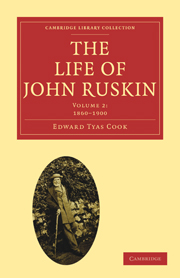Book contents
- Frontmatter
- Contents
- CHAPTER I UNTO THIS LAST (1860)
- CHAPTER II EXILE (1861–1863)
- CHAPTER III BOULOGNE—LUCERNE—MILAN (1861–1862)
- CHAPTER IV MORNEX—MUNERA PULVERIS (1862–1863)
- CHAPTER V HOME LIFE AT DENMARK HILL (1864–1866)
- CHAPTER VI SESAME AND LILIES—THE GROWN OF WILD OLIVE—THE ETHICS OF THE DUST (1865, 1866)
- CHAPTER VII TIME AND TIDE (1866, 1867)
- CHAPTER VIII RUSKIN's POLITICAL ECONOMY
- CHAPTER IX ABBEVILLE AND VERONA (1868, 1869)
- CHAPTER X OXFORD PROFESSOR (1870–1878)
- CHAPTER XI FIRST OXFORD LECTURES (1870, 1871)
- CHAPTER XII A DARK YEAE (1871)
- CHAPTER XIII BOTTICELLI (1872, 1873)
- CHAPTER XIV WITH ST. FRANCIS AT ASSISI (1874)
- CHAPTER XV THE END OF A ROMANCE (1875)
- CHAPTER XVI HOME LIFE AT BRANTWOOD (1872–1876)
- CHAPTER XVII VENICE REVISITED (1876–1877)
- CHAPTER XVIII FORS CLAVIGERA (1871–1878)
- CHAPTER XIX THE ST. GEORGE'S GUILD
- CHAPTER XX THE RUSKIN MUSEUM
- CHAPTER XXI SCHOOLS OF ST. GEORGE
- CHAPTER XXII ARROWS OF THE CHACE
- CHAPTER XXIII “THE DREAM” (1877–1878)
- CHAPTER XXIV STUDIES OF FLOWERS AND ROCKS (1878)
- CHAPTER XXV RETURN TO WORK (1878–1880)
- CHAPTER XXVI THE BIBLE OF AMIENS. FURTHER ILLNESSES (1880–1882)
- CHAPTER XXVII SECOND PROFESSORSHIP AT OXFORD (1882–1885)
- CHAPTER XXVIII PRÆTERITA (1885–1889)
- CHAPTER XXIX OLD AGE AND LAST WORKS (1886–1889)
- CHAPTER XXX CLOSING YEARS (1889–1900)
- CHAPTER XXXI CHARACTERISTICS
- CHAPTER XXXII INFLUENCE
- INDEX
CHAPTER XXX - CLOSING YEARS (1889–1900)
Published online by Cambridge University Press: 07 September 2011
- Frontmatter
- Contents
- CHAPTER I UNTO THIS LAST (1860)
- CHAPTER II EXILE (1861–1863)
- CHAPTER III BOULOGNE—LUCERNE—MILAN (1861–1862)
- CHAPTER IV MORNEX—MUNERA PULVERIS (1862–1863)
- CHAPTER V HOME LIFE AT DENMARK HILL (1864–1866)
- CHAPTER VI SESAME AND LILIES—THE GROWN OF WILD OLIVE—THE ETHICS OF THE DUST (1865, 1866)
- CHAPTER VII TIME AND TIDE (1866, 1867)
- CHAPTER VIII RUSKIN's POLITICAL ECONOMY
- CHAPTER IX ABBEVILLE AND VERONA (1868, 1869)
- CHAPTER X OXFORD PROFESSOR (1870–1878)
- CHAPTER XI FIRST OXFORD LECTURES (1870, 1871)
- CHAPTER XII A DARK YEAE (1871)
- CHAPTER XIII BOTTICELLI (1872, 1873)
- CHAPTER XIV WITH ST. FRANCIS AT ASSISI (1874)
- CHAPTER XV THE END OF A ROMANCE (1875)
- CHAPTER XVI HOME LIFE AT BRANTWOOD (1872–1876)
- CHAPTER XVII VENICE REVISITED (1876–1877)
- CHAPTER XVIII FORS CLAVIGERA (1871–1878)
- CHAPTER XIX THE ST. GEORGE'S GUILD
- CHAPTER XX THE RUSKIN MUSEUM
- CHAPTER XXI SCHOOLS OF ST. GEORGE
- CHAPTER XXII ARROWS OF THE CHACE
- CHAPTER XXIII “THE DREAM” (1877–1878)
- CHAPTER XXIV STUDIES OF FLOWERS AND ROCKS (1878)
- CHAPTER XXV RETURN TO WORK (1878–1880)
- CHAPTER XXVI THE BIBLE OF AMIENS. FURTHER ILLNESSES (1880–1882)
- CHAPTER XXVII SECOND PROFESSORSHIP AT OXFORD (1882–1885)
- CHAPTER XXVIII PRÆTERITA (1885–1889)
- CHAPTER XXIX OLD AGE AND LAST WORKS (1886–1889)
- CHAPTER XXX CLOSING YEARS (1889–1900)
- CHAPTER XXXI CHARACTERISTICS
- CHAPTER XXXII INFLUENCE
- INDEX
Summary
” Sleeps after toyle, port after stormy seas.”
” Note these three great divisions—essentially those of all men's lives, but singularly separate in his,—the days of youth, of labour, and of death. Youth is properly the forming time—that in which a man makes himself, or is made, what he is for ever to be. Then comes the time of labour, when, having become the best he can be, he does the best he can do. Then the time of death, which, in happy lives, is very short; but always a time. The ceasing to breathe is only the end of death.”—So Ruskin had written in Fors Clavigera of Sir Walter Scott. He had marked the passage in his copy of the book, upon rereading it at some later date. His own “time of death” lasted nearly eleven years.
The attack of brain-fever which followed Ruskin's return to Brantwood from Seascale in August 1889 was severe, and it was not till the following summer that he was able to leave his room. He now recognised perforce that absolute rest and quiet were essential, and gradually even the will to exert himself passed away. It is needless to follow in any detail these years of waiting for the end—years in which times of mental storm were intermingled with the peace of old age. He wrote nothing more, and spoke very little, and with hardly any voice. He sat, and listened, and sometimes smiled, but even for children and for old friends he had few words.
- Type
- Chapter
- Information
- The Life of John Ruskin , pp. 529 - 543Publisher: Cambridge University PressPrint publication year: 2010First published in: 1911

